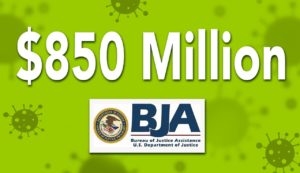Coronavirus Disease (COVID-19) has impacted communities across the country, as law enforcement and other public sector agencies prepare for the short- and long-term effects of this virus. This includes having tools in place to support staffing, training and communication; having ample supplies such as personal protective equipment (PPE); being prepared for evolving community requests; and delivering plans and procedures that reflect recommendations from local, state and federal authorities. 
To ensure that public safety agencies across the U.S. are prepared for the current impact of COVID-19, as well as what lies ahead, Federal grant resources have been issued.
Federal Grant Resources: BJA-CESF
On March 30, 2020 a grant solicitation was shared by the Office of Justice Programs regarding the Bureau of Justice Assistance (BJA) Coronavirus Emergency Supplemental Funding (CESF) program. The funding program has $850 million available and the BJA intends to make 1,873 awards.
The BJA-CESF program will provide funding to assist eligible states, local units of government, and tribes in preventing, preparing for, and responding to the coronavirus. 
In the solicitation, the BJA shared that “States, U.S. Territories, the District of Columbia, units of local government, and federally recognized tribal governments that were identified as eligible for funding under the Fiscal Year (FY) 2019 State and Local Edward Byrne Memorial Justice Assistance Grant (JAG) Program are eligible to apply under the Coronavirus Emergency Supplemental Funding (CESF) Program solicitation. Only the State Administering Agency that applied for FY 2019 JAG funding for a state/territory may apply for the state allocation of CESF funding.”
The eligible allocations for the FY 2020 CESF Program can be found at: https://bja.ojp.gov/program/fy20-cesf-allocations
What will BJA-CESF be used for?
Funds awarded under the CESF program will be used to prevent, prepare for, and respond to coronavirus. Allowable projects and purchases include, but are not limited to:
- Overtime, equipment (including law enforcement and medical PPE)
- Hiring
- Supplies (such as gloves, mask, sanitizer)
- Training (such as training management software for organization-wide virtual training — as well as cross-training of personnel for temporary duty reassignment to assure proper coverage of essential duties)
- Travel expenses (particularly related to the distribution of resources to the most impacted areas)
- Addressing the medical needs of inmates in state, local, and tribal prisons, jails and detention centers.
BJA-CESF program next steps
The application for BJA-CESF is due May 29, 2020. Cities and states are awarded funding on an ongoing, rolling basis from now till the application due date.
For more information how the BJA-CESF program works and grant submission help, visit our Grants Page at https://www.benchmarkanalytics.com/covid19-grants/.
The importance of COVID-19 data collection
The International Association of Chiefs of Police (IACP) has shared that collecting data and documenting response protocols for future review and assessment during this time is important as well. “While pandemics rarely occur, an agency can learn a lot about its emergency response by studying past efforts,” as stated in IACP’s resource Organizational Readiness: Considerations for Preparing Your Agency for COVID-19. Types of data include, but are not strictly limited to, COVID-19-related calls for service, officer exposure, staffing numbers, and health and wellness measures of officers.

To that, agencies are partnering with personnel management software providers for monitoring, tracking and reporting data. For example, the Benchmark Management System® can create custom COVID-19 Exposure Forms that capture interactions related to coronavirus — to help identify trends, facilitate proactive intervention and help keep department personnel serving on the frontlines safe. This data can also be used post-pandemic to justify reimbursement of expenditures at the state and federal levels.
Visit benchmarkanalytics.com to learn more.